|
Holland, Oct. 21, 1945
From Journal
I talked on the trolley to a girl who teaches physical culture rhythmic in the small town where her family lives. They have had Canadians at their house almost every weekend, and she speaks English well. She told me how last winter they had only apples which they had managed to pick and store from their own trees, and approximately one slice of bread a day. It was terribly cold, and there was no fuel. First her mother, then her sister and brother, became very ill. They thought her mother would die. That night she and her father went to the park and "stole" a tree-cut it down, carried home, hid it. It was a rainy night, and the mud covered their tracks. They burned the wood at night, so the smoke would not be noticeable. Now that they had some wood, they traded some apples for potatoes, which before there was no way of cooking. With the little extra warmth and the bit of hot food, her mother managed to pull through, but her little sister, though not so ill at the time, has not made much of a recovery. She probably has t.b. They dread the coming winter, but are sure, somehow, their friends whose countries have not been destroyed will manage to help them get on their feet again. She pointed out houses which seemed to have been bombed, but in a rather neat fashion without the usual surrounding damage. These were houses, she told me, where the inhabitants had simply torn down one section of their house to keep the part they reserved to live in warm. There were holes where trees had been along the parkways: people had dug down to get every bit of the roots.
…I had thought Burke was going to take over on this and am reluctant to go ahead, but apparently they have not heard from him, so guess I'd better. I had hoped the others would take over on this strictly technical side and leave me free for the sob stories, but it doesn't seem to work. For one thing, the denominationalism seems to come out in people when they get on this side, and I have to keep hammering at the interdenom angle….
Well, about 1 p.m. I left Javastraat and betook me to the Town Mayor. Everyone was blissfully confident he took care of people like me and that only he could. So much of the city has been bombed that everyone has doubled up and home entertainment is pretty much out of the question. Laandsmann, for instance, went calling with his family and returned after a couple of hours and found only a hole and pile of rubble where their home had been.
Well, the town mayor had just received word positively no more billeting civilians. He suggested the embassy. Closed for the weekend. I got lost looking for the UNRRA office and landed in the midst of the most desolate devastated region I have seen. (The English did it by mistake-were after some V-bomb installations at some distance and instead got block after block of Dutch homes and offices. Nothing left in that whole section of the city. Except rats.) At that moment what should hove in sight but an American jeep with a stars and stripe on the windshield and a nice curly-headed youngster at the wheel. He slowed up for a turn and I just ran and got in. The UNRRA office was closed, but we found an army orderly-a nice kid from Washington State-and the orderly found a Colonel, and the Colonel called a number and talked in Dutch for a lo-o-o-ng time, and then hung up and said, "You have a room for two nights at the Terminus hotel." I could have kissed the man. If I had seen the room, I probably should have. Large room, overlooking a lovely formal garden. Lovely blonde furniture, with glass tops on tables, chests, etc. Wonderful bed, and when you press the button there is a light panel across the top of the headboard. Luxurious bathroom with oodles of hot water. (Did I soak!) Telephone in the room. Lovely mirrors and beautiful onyx light fixture. It isn't refurbished for upholstery is badly worn and soiled. Suspect it was a hotel Nazis used for themselves. 5.15 guilder = $2.00 day.
…No streetcar on Sunday, so I trudged the streets getting I hope some good pix of children. One place I found a gang hanging around the soldier's mess (Really a restaurant which had been taken over.) The crowd of urchins had a very cute little curly-headed girl with them, and when they saw I was taking pictures they immediately pushed her forward for my approval and got her to pose just right. For which they all apparently hoped I would produce a cigarette apiece. I had none and they had to compromise for a small coin. But they liked having their pictures taken, and other children began to appear from nowhere till we had a crowd of really serious proportions. One little fellow of about ten, sporting a flashy cigarette holder demanded, "Please tell me for what reason are you taking these pictures." I said, "To show the children of my country what the children of Holland are like." He wouldn't get in any more pictures, and I didn't urge him. What I really wanted was pictures of their shoes. Or lack of them. Here it is almost the first of November, and many of these children are completely barefoot. More fortunate ones have wooden soles, tied onto their feet by strings or strips of cloth. Occasionally you see one of these little fellows going around in a good pair of men's full-size army issue boots or shoes and you wonder by what means they came by them. Today I saw on boy wobbling around in a pair of the high button shoes women wore some twenty years ago. A little girl had pieces of newspaper protecting the spots where the strings that held on her wooden soles had cut into her flesh. Stockings are in the luxury category. And let me make it clear that I'm not talking about the unusual but the usual condition. It's the infrequent child on whom you see a pair of decent leather shoes or even the wooden shoes with the wool sox which are necessary to make them passably comfortable. I am told a family of six averaged one shoe coupon a year. Some people have had no coupons since the occupation. I ate lunch with a young girl from the coast, who was crazy to know all about America, and whether a young girl dared come alone. She has been going around with a Canadian solider and her mother doesn't approve. "But you see," she explained, "It is my opportunity to learn the language." I'm afraid the courteous Canadians are rather tough competition for the dour Dutchmen. And the girls here have also felt that they have not had the opportunity to get out and see the world that the armed services of the other nations have offered. Recently a call for 14000 girls to be trained in England for Dutch Marine Service (presumably for the East Indies) brought 70,000 applicants. Women clerical workers are in great demand, but the women just won't work for the wages offered. Every woman I talk to wants to go to America. And the one thing the Dutch will stand in a line for is the chance to see an American movie. Something should be done however about the kind of films we send abroad. It was a relief today to see "Mr. Deeds Goes To Town" at one house, and a good crowd waiting to get in.
Holland, Oct. 1945
From Mimeograph, p. 2
I talked to all kinds of people. A business man told me a week more of occupation would have meant mass starvation. A banker told me how terrible it had been not to know when a member of your family left the house whether he would ever come home, or whether that day the Gestapo would decide to have a roundup and he would be caught in the net-he spoke of the terrifying uneasiness that gripped everyone if the absent person did not return at exactly the hour expected. … A dancing teacher on a train told how she and her father had "stolen" a tree from the public park one rainy night the previous winter, to make a little warmth for the mother, whom they thought was dying. A young lad said he had resisted service under the Germans, but was now on his way to England to train for service in the East Indies; he wondered about it. A woman told how they were to have the first ration of sewing materials in years-and how the papers were warning them not to use them all at once, since there was no telling when there would be more. They had had a shoe ration just that week-so many ounces of leather per person-enough so one person in a family could manage a pair of half soles by using the entire family's rations. A man selling bulbs on the banks of a canal told how the test of a good housewife during the occupation had been her ability to make an edible pie from tulip bulbs and sugar beets. Little children ran about in gangs a good deal, trying in a futile sort of way to be "reckless"-the only way they can find to imitate their older brothers and sisters whose part in the resistance they so idolized.
There was something close to sinister about the way one of these children, hearing you speak English would sidle up and ask softly, "Any cigarettes, lady?" This isn't the stuff Dutchmen are made of, and surely it is a miserable basis for international friendship. I hope the American churches can find something to substitute for a surreptitious cigarette in these children's minds as a symbol of American friendship. I don't see how any teacher is going to be able to get their youngsters back to school and under control again. Take for instance the two little fellows I saw one afternoon hitching a ride on a hearse. How kindly will they take to classroom controls?
Holland, Oct. 1945
From Mimeograph, p. 3
In the course of our relief discussion I mentioned the fact that we did not want to lose sight of the reconstruction program, and asked particularly about laymen training centers. They said I must go down to meet Mr. A. W. Kist in Rotterdam, who is one of the moving forces in a new layman's training center just in the process of formation at Driebergen. I found a very keen young man who was stepping out of a successful law career to take upon himself this service to the church. His wife-an unusually fine person-had spent some years in England before their marriage, and her university work in the field of chemistry. Their baby was born in the dark and hungry months just before the liberation, but is a fine happy little fellow who they are glad is too young to remember the times when neighbors gathered together to share their one hour a day fuel allowance, their meager rations, and their terror for the life and safety of absent members. It was shortly before he was born that the Nazis rounded up 50,000 Dutchmen of one district in Rotterdam in three days. Mr. Kist managed to hide for a week under the eaves of his own home. Of the 16 men of his college club, all of whom were in the resistance movement, eight had been in prison, and three of his closest associates had been murdered.
While we were talking, Mr. Landsman called to say that Volks Herstel was making a car and driver available for the next day at 9 a.m. and Mr. Kist generously agreed to go with me to interpret both the Dutch language, and more important, the work of the Church I was to see.
Around Zeist we left the low country and came to a pleasant wooded area, now beautiful in its late fall coloring. And at Drieberger we turned in at a lovely estate known as De Horst, the Eagle's Nest. Here on November 12th was opened the training center for lay workers-a project of the Church and World Movement of the new Reformed Church Synod, but which they hope will become an ecumenical center used by all Protestant Churches of Holland.
The large white house had been occupied by an aged baroness, and we found her in the midst of packing. The art treasures which her father had collected still hung on the walls, and would have graced any art gallery. Beautiful cabinets of inlaid wood had been emptied of their contents ready for moving. In one room was a heart-warming array of some of the loveliest bronzes I have seen-many works of ancient Holland craftsmen. The baroness chuckled as she told me how she had given the Nazis enough brass to send them on their way, while these good pieces were safely buries out in the grounds of the estate. I said, "How can you bear to give up your home?" She replied, "This is a new day. The house is too big for one old lady. I am so happy that it is going to be used for such a good purpose."
The school will open with 60 picked students, about half men and half women, chosen from many times that number of applicants, through aptitude tests and personal interviews. Ages range from 20 to 30, average age 25. They must be graduates of the 6-year gymnasium or lyceum course or the equivalent (i.e. this will be college grade instruction.) Instruction will cover both practices and theory under four faculties: theology, social studies, psychology, cultural subjects. The young people will prepare to be youth leaders, social workers in factories and laborers' quarters, and pastors' assistants.
….
From Driebergen we went on to Arnheim, and I saw for myself what a community looks like when out of 20,000 houses only 157 remain undamaged by bombs or shellfire, or deliberate sabotage. It was terrible. Yet it was inspiring, too, for though many of the civilian inhabitants were evacuated during the fighting of the Spring months, they were now back-doubled up two or three families in a house perhaps, or living in a comparatively undamaged section of their home, while everyone pitched in to try to restore the more promising ruins to livability before the winter set in in earnest. Of course, there is block after block of mere rubble, or gaunt ghostly walls. Workmen were patiently cleaning and stacking the salvageable brick, but it all looked very hopeless.
…
Late in the evening we visited one of the deaconess' projects. It was a school for crippled children, fifteen boys and eight girls. Many were missing a limb. Some would never walk; some talked with difficulty besides their handicap of distorted limb or twisted back. Yet they were as bright, cheerful, responsive, yes, as poised a group of youngsters as I have ever met. They had just finished supper and the girls cleared away their table and set bread and some American jam and some Holland cheese, and apples from their own trees before the visitors. Little Eve, the youngest, who can remember no other home and calls the sister 'Mother", must put on her new artificial leg and show me how splendidly she can walk and even run and jump with it. Cora must keep to her wheel chair and it is difficult for her to talk, but the others made a great deal over her and told me she had just returned that afternoon (they had all had to be evacuated during the past winter, and had apparently greatly missed their "home life" together.) Mary, the eldest, who is perhaps 14, came and sat by my elbow while we ate, and acted as translator with her English which she "learned out of a book" not, like the smattering of some of the others, from the Canadians. The children have regular classes and are allowed to learn besides their basic subjects, "anything which interests them and that they can do." In the workshop the boys had been doing some fine cane work. The girls had acquired a "new" treadle sewing machine. "But nothing to sew on it," they reported, "and no thread."
Mary had a particular aptitude for languages and was learning French and German as well as English. She is radiant and gracious, and enthusiastic over the opportunity which is hers in Deaconess' school, but she wishes many more children could have the privilege. So does remarkable Sister Jans who fourteen years ago came to this work from her training in the deaconess' hospital. But in spite of the need for such care-a need tremendously augmented by the war-this small establishment is the only such Protestant institution in Holland. There is a large well equipped Catholic school for crippled children, and state institutions, but the deaconesses feel that somehow this should be a responsibility of the Church, and that there are many child victims of the present war who should have the kind of loving care and Christian influence that they would offer.
Then there were the Heldring Homes of Zetten. It was almost exactly a hundred years ago-1848-that a young woman just being released from prison came to a pastor and asked him for help. She was deeply repentant of the evil life she had been living but she found all avenues of change to a better way closed to her. Pastor Heldring investigated her story and found that it was true, and that there were many girls with the same story. And so a woman's home at Zetter came into being-the first of a center of church institutions for women, which, at the beginning of the war, included not only rescue homes, women's reformatories, Magdalene House for unmarried mothers, Telitha Kumi House and Little Telitha for young girls who one way or another had come under the jurisdiction of the courts or whose home life made it desirable to place them in an institution, but also a normal school, a boarding school and a girl's high school, and an institute of domestic economy. The community must stand for normal character building as well as rebuilding.
The center had its own church where at the beginning of the war 1200 girls attended services each Sunday morning. As the fighting drew near in the fall of 1944, (Zettan lies between the Wall and the Rhine rivers) girls who had been home or on farms for the summer could not return and those who were still living in the buildings had to be evacuated. The final evacuation came in a dramatic manner on December 3rd, after the Germans had blown up the dike protecting the island. Babies and their mothers were loaded into open army trucks and taken to a shelter through a torrential rain and amid Nazi shell fire.
When the flood waters had subsided and the fighting was done, Heldring Homes were a sad story. Some can be rebuilt, but many are completely wrecked. Yet in the meantime the problems that arise out of war have served to seriously increase the very type of Christian service that Heldring was best equipped to handle.
Mr. B. ter Linden, who as President-Director of the Institute spent the first 19 months of the German occupation in prison, invited us to visit one of the few buildings which is still usable. Here we found some 40 little tots of two and three years-children of the occupation, fathers unknown. Their presence pointed up the many moral problems that was always brings in its wake. Heldring, both in its aspect of helping girls to become fine young women, and in its work of helping those who have made mistakes to find their way back again, will be sorely needed in the days ahead.
…
One day I went shopping in Amsterdam. That is, I stepped inside the door of several stores…Of course, there were some things you could buy. An expectant mother, for instance, could get an order allowing her to purchase six diapers. Not six dozen. Six.
…
Burke dropped in at the hotel one day-he had been down in Belgium. He seemed like a very old friend. It was he who suggested I should visit the camps for collaborator's children, with Miss Bendien, one of the social workers. I have already written about those institutions, where to the cold and hunger and sense of homelessness which is common to so many European children is added the stigma of being ostracized. It is not that Holland wishes to be vindictive, but circumstances combine against these children. The Church is urging that Christian families take them into their homes.
Holland, Oct. 27, 1945
From Letters--to her daughter
I went out taking pics this morning. Got several of the urchin type of thing, then ran into some groups of folks going out on hikes (imagine with wooden soles for footgear!) I took some boy scouts and then spotted a mixed group of youngsters and began on them. They loved posing and I took quite a lot, then asked who they were. Community Youth Organization-and so glad to be able to meet after all these years of repression, etc. Do you think I dare use their pix to collect church funds? And they were the cutest little monkeys. Principle trouble with taking pix here is that everyone wants to get in the picture and wave and grimace. I start to take one child's picture and the first thing I know I'm blocking traffic in a serious manner.
I didn't tell you my secondary reason for going to Paris now-the first being as I said, to get your letter. But also I hope to get to go with a trainload of youngsters under Red Cross supervision from Paris to Czk. Repatriated. It should give me a fine experience if I can manage to do it1 In a way I like Holland very much, though there is practically nothing of the picturesque about it now. But I'd hate to have to belong to a place where the position of women is so bad. There must have been a great manpower shortage here at some critical moment in Holland's history. The men swagger and show off and act likes lords of creation. The girls ogle at them and try to get their notice. Women's wages are vile, and I don't think I've seen any in good jobs. It goes strangely with the queen-Juliana-little princesses idea. You see their robust pix everywhere.
|
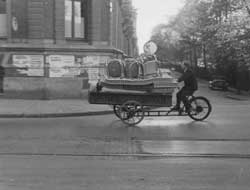
Moving day in Holland. It takes a good many trips to get all a family's possessions moved in a contraption like this.
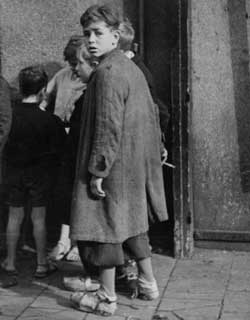 Amsterdam. Boys this age are restless-uncontrolled. They want to ape the 'dangerous life' of older brothers in the resistance movement, but have no outlet. Amsterdam. Boys this age are restless-uncontrolled. They want to ape the 'dangerous life' of older brothers in the resistance movement, but have no outlet.
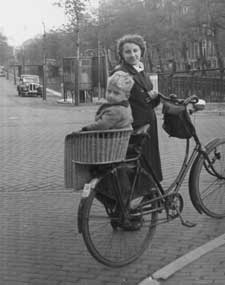
Happy the family that owns a bike! Many of the bicycles, however, are without tires. Some just run on the rims; other use all sorts of make-shift materials for tires.
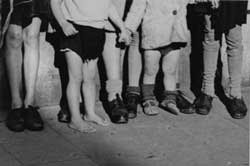
These little feet are poorly equipped to tread the road to democracy.
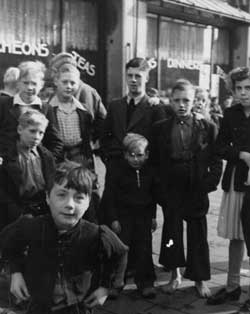 Probably hoping for cigarettes (best currency) from Canadians visiting English tea room.
Probably hoping for cigarettes (best currency) from Canadians visiting English tea room.
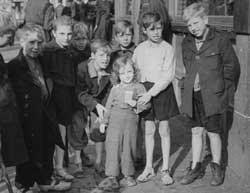
Children of Amsterdam. The little girl was this 'gang's' darling. She got the first bite of every chocolate bar the boys could tease from Canadian soldiers.
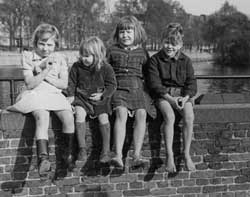
Degrees of shoes: boots, oxfords, wood-soled sandals, bare feet. You wear what you have and are thankful if you have any. Holland receives its first shoe ration in October 1945. It took the allotment of 6 persons to get one pair of women's shoes half-soled; that of 8 persons to repair a pair of men's shoes.
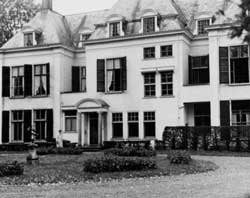
Laymen's training center at Driebergen. A.W Kist, director. This estate formerly belonged to a wealthy baroness. Now houses young people who will train as lay church workers to carry evangelism through daily living to workmen's groups, hospitals, young people's organizations, journalistic schools.
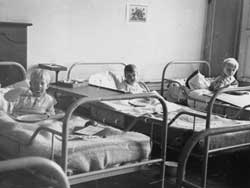
Children's home in North Holland.
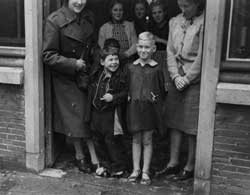
Children at the Home for Collaborators' Children in North Holland. Material had just been received to make some benches for the dining room, so children could sit down to meals.
|










